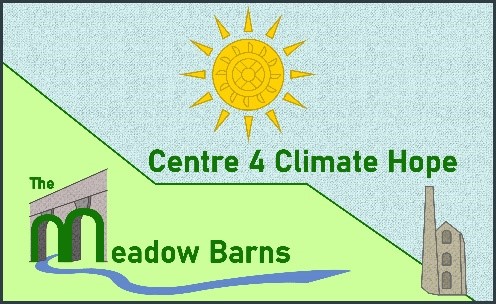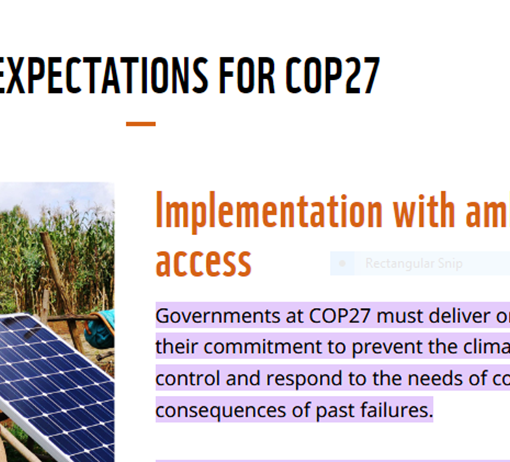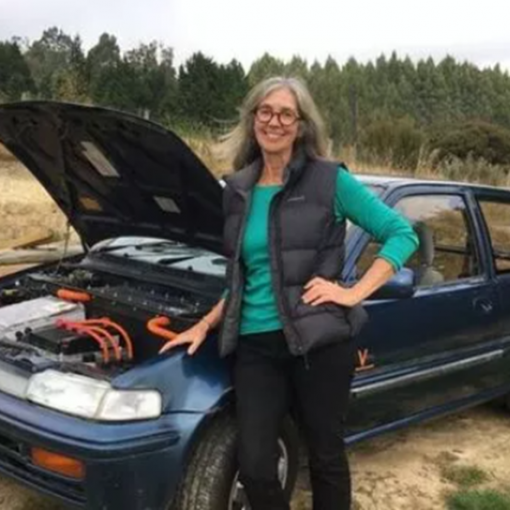9th SEPTEMBER 2022
Droughts, floods & the energy crisis. Is there any good news as autumn arrives?
Back in business, after our summer break, there has been a massive amount of material to sift through on your behalf.
DROUGHTS
As the weeks progressed through August news of droughts got worse and worse. Many parts of the UK are now subject to hose pipe bans and farmers are struggling to cope, using up winter feed for their animals. Apart from the blip of 1976, farmers in this country have not needed to learn about managing pastures and crops in such dry conditions. Now they must!



Sheep & dogs were on TV
Around Meadow Barns I observe fields with bales already set out but, in a chance meeting with the farmer, discover the silage is not for immediate consumption. It will be supplementing the next crop of ‘stubble turnips’ to feed stock through the winter. He explained that this is part of a multi-year rotation scheme, turnips in winter, followed by spring barley and eventually back into grass. It is a good value option on land that drains well – better for the planet and for the farmer’s purse.
Still wandering dried out fields, I can see obvious differences between land that has been grazed by cattle and sheep. Yes, after decades without them we have sheep back at Penpell Farm … reminds me of when my father had 200 head or more grazing, and controlled them with prize-winning dogs. Harry the Shepherd, shown with Phil Drabble on One Man and his Dog, above.
Sheep are a tad better from a greenhouse gases point of view, producing about 30 litres of methane each day, whereas a dairy cow would be releasing up to about 200. Latest research at the University of Bristol and the Teagasc Animal and Grassland Research Centre in Ireland, has found a link between methane production and levels of a compound called archaeol in the poo of cows, sheep and deer. The compound enables better tracking of methane emissions, confirming that two groups of cows fed on different diets produced markedly different amounts of methane. The group that was allowed to graze on as much silage as they wanted emitted significantly more methane than those given a fixed amount of silage, supplemented by concentrate feed (turnips were not mentioned!)
“This confirms that manipulating the diet of domestic livestock could also be an important way of controlling methane gas emissions.”
Droughts beyond our borders
France, Italy and Spain are reported to be experiencing the worst drought in over 500 years. Reservoirs and rivers are down to 40% capacity or less, with shocking loss of crops, for instance the olive harvest, vegetables and the sunflowers in Spain. The region of Andalucia is the ‘vegetable and fruit garden’ of Europe, but extensive and often illegal drilling of new bore holes for irrigation, to support non-native crops, has added to the problems caused by climate change.
In the article shown below, Julio Barea, a water expert at Greenpeace Spain, calls for a restructuring of the agriculture system. She is joined by Julia Martinez, biologist and director of the FNCA Water Conservation Foundation, who says Spain is currently the European nation “exerting the most pressure on its water resources. We cannot be Europe’s vegetable garden” while “there are water shortages for the inhabitants,” so “Today there are decisions that no one wants to take. We can’t continue to blindly forge ahead,” she says.
An almost identical situation has developed in California, where the underground water is severely depleted.
Take note! Looks like the planet is going to force us into taking action. More on this below.
https://www.france24.com/en/live-news/20220808-drought-forces-water-use-rethink-in-spain

All around the world the pressures on water are increasing. I found a very good overview in an article by the World Economic Forum, for the UN https://www.weforum.org/agenda/2022/08/drought-water-climate-un/
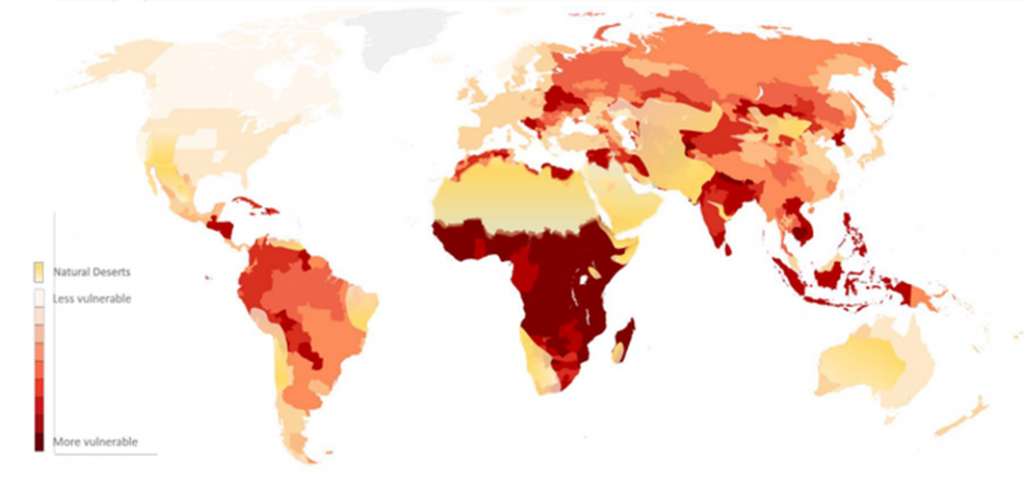
Not everyone can face reading such gloomy predictions, however this one has some positive news in the latter part. For instance a story of farmers in Niger, where they have substantially reduced drought risks by creating new agroforestry systems on five million hectares of land. Average costs have been below $20 per hectare. Vegetation cover has increased over seven million hectares of land in the Sahel over the past 25 years due to interventions such as changes in tree management and tenure.
And another – in the most drought-prone provinces of Vietnam, Cambodia, and Indonesia, the adoption of drip irrigation has yielded very promising results. Vegetable farmers there were able to increase water-use efficiency by up to 43% and yield by 8%-15%. At the end of the report, a film about growing ‘pigeon peas’ in Madagascar is very short but introduces a truly welcome note of hope. If you have a moment do watch it, either by navigating through the report or using the quicker & more direct link on France24 below.

Going East, to Asia, China has been struggling massively with temperatures above 40C since June. The longest and hottest heatwave since records began, as illustrated by another film – https://www.independent.co.uk/climate-change/news/china-s-drought-pictures-heatwave-b2153683.html


There are little hints of hope, in this film:-
- the innovative centres created underground in sub-way stations, to keep people cool
- the switching off of neon lights in city centres + other reductions to save power (city centres lit up like Christmas trees must surely become a thing of the past now? Long overdue!)
China has pledged to do more to combat climate change and faster, than most other regimes around the world. They say they will bring Co2 to a peak before 2030 and become “carbon neutral” by 2060. They are racing ahead in renewable energy development. A great deal of their energy usually comes from hydro systems, but with no water this summer I do not feel we can point a finger of blame, as they have had to switch on more coal-fired power generation to cope. We can hardly be smugly complacent ourselves, if Liz Truss decides to live up to her promises with increased production from North Sea oil and gas. ☹
FLOODS
At the other extreme, last week we were seeing 1/3 of the land mass of Pakistan under flood waters.


April 22 below, current floods above
The Pakistan prime minister said these are the worst floods in their recorded history, but the devastating effects are worst in the South Punjab, where indigenous farming people have been exploited by rich land owners, over hundreds of years. The result is they now find themselves homeless, their crops washed away, without any resources to fight back.
PRAYING to a PLANET REGULATOR
‘We prayed to the god but the god wouldn’t rain’. I know I am straying onto tricky territory here, tiptoe-ing into the topic of religion. I am not thinking of a God, exactly. Rather pondering a higher power, possibly a ‘Planet Regulator’ and what would that person/brain be thinking, with regard to the future of the human race? What may their strategy be, for forcing the most consumer-orientated, self-centred and ignorant peoples of planet earth to change their ways?
Imagine that this ‘Regulator/God’ saw the Population Matters movement and observed, ‘this is vital.’ Ever expanding numbers of people cannot be sustained, so I will have to send some plagues to the world to trim back the numbers. How Biblical! Covid 19 first, but now Avian flu and Monkey Pox. And in the past few days, a new type of deadly pneumonia in Argentina. Eeek, there may be much more to come. Do you believe this is the planet regulating itself?
Perhaps some unintended consequences arose from Covid, for the Regulator to consider. I mean wiping out disproportionate numbers of sub-Saharan citizens, who tread very lightly in terms of the resources they consume, was not ideal. And the great damage to mental health through lock-downs and isolation, that was another unfortunate result. It was much harder on the people we most need for ideas & solutions – the youthful, energetic citizens and the oldest, with experience and deep knowledge.
What else is the Regulator trying? The latest plan must be the War of Energy – ‘I will set up challenges that force people to think more about all the resources they consume. By severely reducing the heat they can buy, especially that which burns fossil fuels, is it possible I can force them to invent new ways of living? I’d like to correct the isolation, replacing it with big group gatherings in one large space. I’d like to see them make their own heat, through brisk exercise rather than flicking a switch.’
Those are ideas that I like! Can we get people out of their houses every day, to meet up with and accompany a neighbour? Walk, cycle, if necessary take a bus. Get to a village hall or sports hall, do a 30 mins exercise class, then 30 mins with a hot drink, socialising, sharing ideas. Some nutrition perhaps, in form of a bowl of raw vegs, nuts and seeds; more for those in greatest need, to keep people going until their one main meal of the day. And finally, 30 minutes helping to clear up and prep for the next group.
Is this utterly fanciful stuff? Actually no. Something like it is already being planned by the more innovative and caring councils, for instance – Bristol.
WARM COMMUNAL PLACES this winter
ITV NEWS reported, in early June that plans were already advancing.
Warm communal places will be set up in Bristol for people who cannot afford to heat their homes this coming winter.
As energy bills are set to skyrocket again in October, fears are mounting about the many people who will struggle to pay their heating bills as the weather turns colder. Bristol City Council is planning to set up “warm places” across the city to help people who can’t pay.
Marvin Rees, the mayor of Bristol, made a plea for help providing these warm places, and money to set them up. Mr Rees said ‘Welcoming Places’ will be a city-wide network of spaces where people can go and be warm. The mayor said they will also be putting things around that such as food, benefits advice or educational support. (why not the exercise too?)

“It does feel like a war-time mobilisation, that we will have these places where people can go and they won’t have to worry about having their heating on and they can just be warm,” he continued. “It will be some of our buildings such as our libraries and we are also talking to schools. We will create a real community hub where we can bring people together, and break down isolation as we go into those colder months.”
HEARTS of GREEN PARTNERS
Coming back to Cornwall, we have some encouraging news, right now. For instance, the growing list of partners to work with, in both Heritage and Energy projects.

You already know of our recent collaborations with Rupert Armstrong Evans and Councillor Colin Martin, appearing together on TV. I have also shared Rupert’s opportunity for people to learn hydro skills and we set up the hydro petition together (which still need lots more signatures by the way, & it will close in October ☹). Well, in my hunt for news last week I was very excited to discover that the Evans web page tells of the intriguing and incredible REEF project, for tidal energy in the Bristol Channel. I hope to be able to interview Rupert about this and write it up soon. If you can’t wait, it’s here https://www.evans-engineering.co.uk
There has been a good deal of progress with our other partners too – Eden Learning and Eden Geo-thermal, Exeter University, Cornwall Council, West Country Rivers Trust. Cornwall Heritage Trust and more.
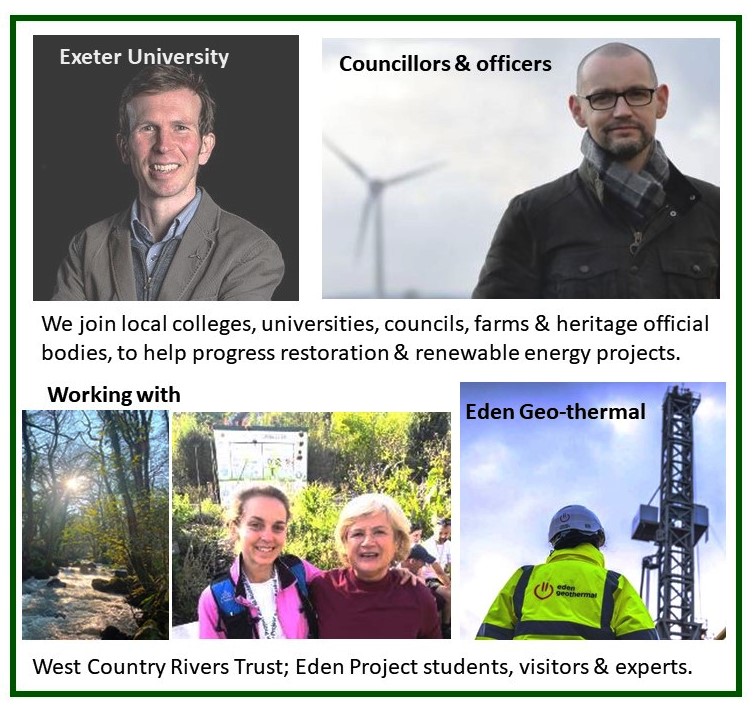
In July, David attended a course to study and make small wind turbines at Penryn Campus with Richard Cochrane (shown smiling above!). We have become very interested to explore the most up-to-date news on domestic size turbines, to find if one might be feasible for Meadow Barns site. I have tracked down a specialist architect company, who drew plans for an eco-town in North Devon, where every house would have its own wind generator incorporated in the roof. I await answers on this topic from the CEO of Rundell Associates, which should be very fascinating.
I also linked up with FuturEnergy.co.uk, but they are currently closed for annual stock-take, so an actual interview must wait. I found their online PDF about the right conditions for small wind installations to be invaluable. Sorry to whet your appetite and not give all the info right now, but I think this domestic wind report will come soon and will be worth the wait.
The news from Eden Geo-thermal is, following many hold-ups and frustrations, real testing is now underway to see how much hot water can be brought to surface for heating the biomes.
Just to let you know that we’ve now completed our well cleaning operation and much of the equipment used for that process is leaving site.
We will be carrying out an air-lift production test next week. During the test we may see some steam at surface, from the hot water below ground. It will be steam and not smoke, so if you do see anything, please be reassured there’s nothing to worry about. There’s more information about production testing on our website at Well testing – Eden Geothermal.
We’ll be using a compressor and a separator for the air-lift test and, depending on wind direction and weather conditions, this may be noisy. We apologise in advance for any inconvenience that may be caused. The test will run all day but not overnight.
A little later we’ll carry out a small injection test, before the remainder of the cleaning and testing equipment is demobilised and this stage of site operations is finished, by Friday 2nd / Saturday 3rd September.
STILL at EDEN, there is another whole story to relate, again connected to the Geo-thermal project. It’s a collaboration with Oxford University to research water in the earth’s crust. Meadow Barns and some other landowners near us will take part, but it’s not yet clear when their team will visit.
YOUNGER PARTNERS
Perhaps more important than all the other links, are the new ones with young illustrators for one of our future publications in the Hearts of Green series. This will be a guide to making greener homes and – as you can tell – is a re-working of the old tale of 3 Little Pigs. The drawings are full of character and colour, but many more are going to be required. So, we are hoping to run an Open Day here in the next month or so, hosting 4 other Par-based creative artists to run short free sessions, for families with primary or pre-school age children. Send a text message to be put on the list, as space will be limited (07967 653346).


MORE PUBLICATIONS and how to receive them.
On 1st September a Meadow Barns online Story Shop went live. Here are 2 very short films, to give a taste of the content: –
https://www.youtube.com/watch?v=q44oGLp5kEY STORY WALK ADVENTURE EPISODE 1
https://www.youtube.com/watch?v=TBtnbg_ou5M STORY WALK ADVENTURE EPISODE 3
We have put up 8 titles to start with, a mix of written words and pics that you can download to your printer or phone, along with audio versions of the same history stories. There are 2 song packs as well, ‘Songs for Special Days’ (maybe you can share the info about these if you are in contact with schools or churches). Our plans for more publications include the 3 Little Pigs story above, which hopefully will be up in time for Christmas!
Now from my perspective as author, I will love any sale that happens. But, selling through the online Gumroad system, I lose £1.45 from every £5 purchase that people make. This is for VAT and charges to run the VAT reporting.
As an alternative, if at all possible, I am asking people to sign up and pay to be a member of the ‘Hearts of Green’ supporters, at Meadow Barns. Then I can email out the products to individual members, without VAT. I can also offer purchasers a list of other benefits for their money. We’ve set the annual fee at £15, which is quick and easy to pay by taking this link
https://themeadowbarns.co.uk/product/the-hearts-of-green-membership/
The full list of benefits is here www.themeadowbarns.co.uk/green-campaigns, or look below for an overview.
Perhaps, in the longer term, the blog itself will have to come with a price tag. But for now, the team have been debating options and we don’t want to ask everyone to pay. On the other hand, annual insurance for the centre costs over £1,000 and running the site, upgrading displays is easily £1,500 on top of that. I have run at a loss for 2 years but it is time to turn things around and begin to break even. You can help and we hope you will!
Thanks for reading and all good wishes Caroline

If you prefer to buy a single product, here is the gumroad shop. https://cjstephenson.gumroad.com

